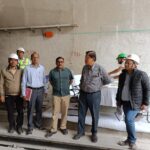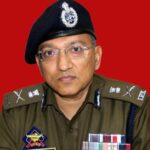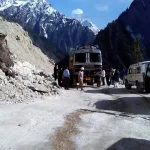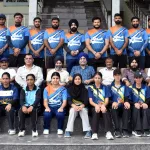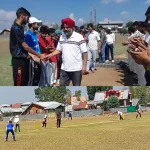Chief Electoral Officer (CEO) J&K, PK Pole has said that all preparations for the upcoming Lok Sabha elections for Srinagar Parliamentary seat on May 13 have been completed. In an exclusive interview with Rising Kashmir’s Chief Reporter Irfan Yattoo, Pole expressed optimism about a substantial turnout during the 4th phase and stated that all preparations have been completed.
Excerpts:
Q1: Can you elaborate with regard to ECI’s preparations for the fourth phase of LS polls in Kashmir?
For the past 6 months, the preparations for LS polls have been underway. Two phases have been peacefully conducted and we hope that rest phases will be also conducted in the same manner.
Around 17,47,810 lakh voters have been enrolled in phase IV, including 8,75,938 male and 8,71,808 female voters besides 64 third gender electorates.
There are around 11682 Persons with Disability and 705 persons above the age of 100 years who will also be exercising their franchise. Around 2,135 polling stations have been set up in the fourth phase across 5 districts of Srinagar, Pulwama, Budgam, Ganderbal and Shopian (37- Shopian).
The election staff including Presiding Officers will be stationed in every polling station. In total, more than 85,00 polling staff, including reserves, will be deployed on duty on the polling day.
“All preparations have been completed including commissioning of EVMs, Symbol loading, names of candidates and training of staff has been completed. More than 40 % Home voting for above 85 age and disability was held at door steps for all those applied.
Q2: How are polling stations prepared to accommodate voters?
The voting will take place from 7.00 am to 6.00 pm and before that there will be a mock poll in the polling stations in presence of the polling agents. Also, the voting will continue even after 6.00 pm, if the voter’s queue is still there in the Polling Station premises to utilize their right to vote.
Every polling station will be provided with Assured Minimum Facilities (AMF) like drinking water, electricity, toilet, ramp, furniture, verandah / shed besides wheelchairs will also be provided to the needy.
The ballot unit will also have a list of contesting candidates in braille script. Where ever required, there will be separate queues for senior citizens and specially-abled persons facilitating them with early polling. Additionally, there will be a voter help desk, manned by the concerned Booth Level Officer (BLO).
Q3: How many pink and special polling stations are in operation?
There are a total of 20 pink polling booths, exclusively managed by women, along with 18 booths staffed by specially abled individuals and 17 manned by youths.
Additionally, there are 21 green polling stations aimed at promoting environmental awareness. These special polling stations aim to encourage various segments of society, including women, the specially abled, and first-time young voters, to actively participate in the electoral process and exercise their right to vote.
Q4: What measures have been implemented for monitoring polling stations during Phase 4 of the elections?
To enhance transparency and security, all polling stations in Phase 4 will be equipped with CCTV cameras for live webcasting. These cameras will stream footage to control rooms set up at District and CEO offices, ensuring effective oversight of the voting process. However, some polling stations may be located in communication shadow areas.
Q5: How are communication challenges addressed in polling stations situated in shadow areas?
Alternate arrangements have been devised for polling stations in communication shadow areas. These include provisions such as Satellite Phones, Wireless sets, and Special Runners to ensure seamless communication and facilitate the smooth conduct of elections in these areas.
Q6: How are voters facilitated in identifying their respective polling stations?
To facilitate voters in identification and enhance voter turnout, all voters have been provided with a voter information slip containing essential details such as the polling station name, date and time of the poll, the serial number of the voter in the list, their full name, and a QR code.
However, the voter information slip does not include the photograph of the voter and therefore cannot be used as proof of identity at the polling station.
Additionally, citizens can access details of their polling station, parliamentary constituency, and contact information for the Booth Level Officer and Electoral Registration Officer through the Voter Helpline App (VHA).
Q7: What documents are accepted as proof of identity for voting, in addition to the Electoral Photo Identity Card (EPIC)?
In addition to the Electoral Photo Identity Card (EPIC), voters can utilize a variety of documents to verify their identity and cast their vote. The EPIC card is not obligatory for voting.
Accepted documents include the Aadhaar Card, MGNREGA Job Card, passbooks with photographs, Health Insurance Smart Card issued by the Ministry of Labour, Driving License, PAN Card, Smart Card issued by the Registrar General of India (RGI) under NPR, Indian Passport, pension documents with photographs.
Q 8: How has media coverage been facilitated during the polling process?
To ensure comprehensive coverage, 600 journalists and cameramen from print, electronic, and social media platforms have been granted passes. These passes enable them to cover the polling process while maintaining the secrecy of the vote and without disrupting the democratic exercise.
Q9: How will voter turnout information be disseminated to the media?
The Voter Turnout App will play a pivotal role in providing real-time updates on estimated provisional voter turnout for each Parliamentary Constituency. Returning Officers (ROs) will input this data into the app, which can also be accessed by the media.
Additionally, the app will display approximate voter turnout data for each phase of the elections. To ensure timely updates, there will be two-hourly reporting of voting percentages from 9:00 am until the end of polling. The Assistant Returning Officer (ARO) and RO will collaborate to share this data with the media accordingly.
Q 10: Can you provide an overview of the material and cash seizures during the election period in the Union Territory?
Since the announcement of the election until now, various enforcing departments have seized material and cash amounting to approximately Rs 44.23 crore.
This includes seizures by the Police Department, valued at Rs 40.56 crore, the Income Tax Department with seizures worth 32 lacs, the Excise Department seizing around 85 lacs, and the Narcotics Control Bureau confiscating drugs worth 2.32 crore.
Q 11: What measures have been implemented to monitor election-related activities and ensure compliance with the Model Code of Conduct (MCC)?
To effectively monitor election-related activities and enforce MCC compliance, a Command-and-Control Room has been set up at the CEO office in Jammu.
Additionally, mini control rooms have been established at every District Election Officer (DEO) office, operating round the clock. These control rooms not only scrutinize MCC violations but also receive live feeds from more than 100% of the Polling Stations and monitor the GPS tracking of all vehicles used for poll parties.
Q 12: Could you provide information about the establishment of Special Polling Stations for Migrant Voters in Kashmir Division?
In accordance with the latest directives from the Election Commission of India, Special Polling Stations have been established to facilitate voting for Migrant Voters in Kashmir Division.
A total of 26 Special Polling Stations have been set up, with 21 polling stations in Jammu, 4 in Delhi, and 1 in Udhampur District. Each Special Polling Station will have a designated exact voter list managed by Booth Level Officers (BLOs).
Q 13: What’s your message to voters?
I encourage voters to actively participate in the electoral process, considering it the “biggest festival of the largest democracy in the world. Voting is not just a right but a responsibility, and voters should choose their representatives wisely.



